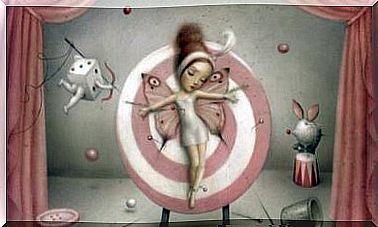How To Deal With Despair And Depression
In today’s article, we talk about how we should deal with despair.
There are times when we feel desperate because we can not understand what is happening around us. We feel angry at ourselves and take it out on our loved ones.
The truth is that behind these disturbing psychological realities we see the other side of depression. Despair is the echo that arises from the void.
It is the feeling of having lost hope, an infinite sorrow that people who think they have lost everything feel, those who can no longer see any light on the horizon or meaning in their existence.
Few psychological states can become as dangerous as the point when a person no longer knows which path to take or what he or she can really believe in.
We know that despair is a common human experience. Philosophers like Søren Kierkegaard have talked a lot about it and defined it as a lack of meaning and challenge.
Jean-Paul Sartre, on the other hand, said that it is the frustrating inability to move forward, as well as the cowardly negativism that society often drives into us.
From a psychological point of view, no one has dug deeper into human despair as much as Viktor Frankl.
He was the father of logotherapy and a survivor of several concentration camps. He defined this concept through two very basic ideas: suffering and loss of meaning.
These experiences are undoubtedly some of the gloomiest for a human being, but it is still possible to deal with despair and come out stronger on the other side.
We all have the ability to face life with renewed strength and resources.

Deep despair can cause depression
If every person on this planet lacked purpose and meaning, it would create utter despair.
Although we often define this situation as a mixture of sadness and lack of hope, we should realize that it is much deeper than that.
It is a feeling of emptiness and a state of mind where someone does not stop asking questions you do not have the answers to. Here are some examples of said questions:
- What is the meaning of this life?
- What is my place in this world?
- What can I do in this situation where nothing seems logical?
These types of questions only feed the cycle of despair and take the person further and further into psychological darkness.
Desperation is driven by anxiety
Studies like the one that Dr. Martin Bürgy from the University of Stuttgart in Germany suggested that despair is a subject that has been neglected until quite recently in the world of psychology.
For some reason , we always seemed to leave it to the world of philosophy, which tries to answer questions about the more existential problems in life.
- But cognitive psychology is now very clear that this condition is very clinically relevant. Despair can manifest at any time in our lives.
- We can feel it in moments when everything seems to go against us and we feel that we are not getting anywhere. It can lead to very serious problems in our lives.
- It arises when we end up in cycles of obsessed thinking full of negativity and helplessness. These negative thoughts are mixed with a complex network of emotions such as sadness, anxiety, anger and frustration.
It is very common for despair to manifest as a result of anxiety. However, if this situation is maintained over time, the person will almost inevitably drift towards a depressive disorder.

Deal with despair by facing your problems
Leaving despair untreated can create a host of extreme ideas in a person’s mind.
Suicidal thoughts can manifest in our minds as a result of the total loss of meaning and hope. In this dangerous condition, it is important to seek psychological help.
Despair is something that is almost always present in severe cases of depression and even in bipolar disorder.
These are very sensitive situations that often require pharmacological treatment along with therapy. But as we said at the beginning, these situations can be overcome with specialized help and commitment.
Deal with despair by channeling your anger
Anger is powerful, motivating and transformative if we channel it well. Despair is manifested from the anger of people who find no meaning in anything.
They are angry at the world and at themselves. This, no matter how surprising it may sound, is actually good. The most dangerous are instead apathy, immobility, not feeling anything, emptiness and basically that nothing means anything.
But if we try to use anger to our advantage and make changes, things will gradually start to improve and find a new balance.
We just have to channel the negative energy and turn it into something positive that melts away the problems we face.
Start again by putting yourself face to face with yourself
Some say that despair means that our darkest side captivates us. Our darkest side is the one who wants us to be weak and lost.
Carl Jung pointed out that the purpose of psychological therapy is transformation and above all to reach the point in our lives where we find true meaning with our existence.
Despair forces us to talk to ourselves, to confront our darkest side. It is therefore our duty to accept the “dark side” to which Jung refers and to be able to defeat it.
Only then can we reach the brighter and stronger side where we can find hope and security again.









